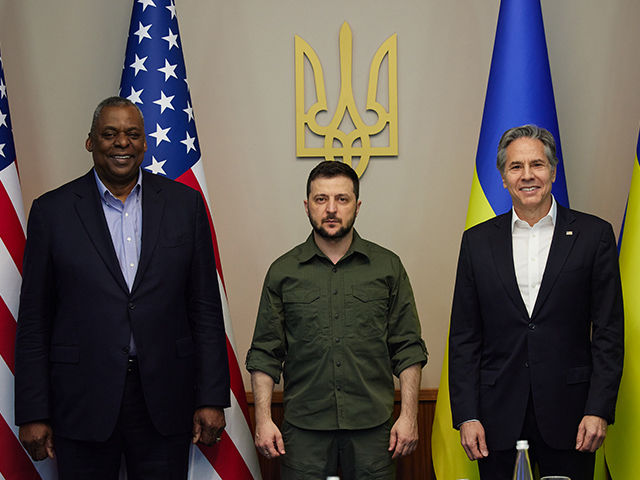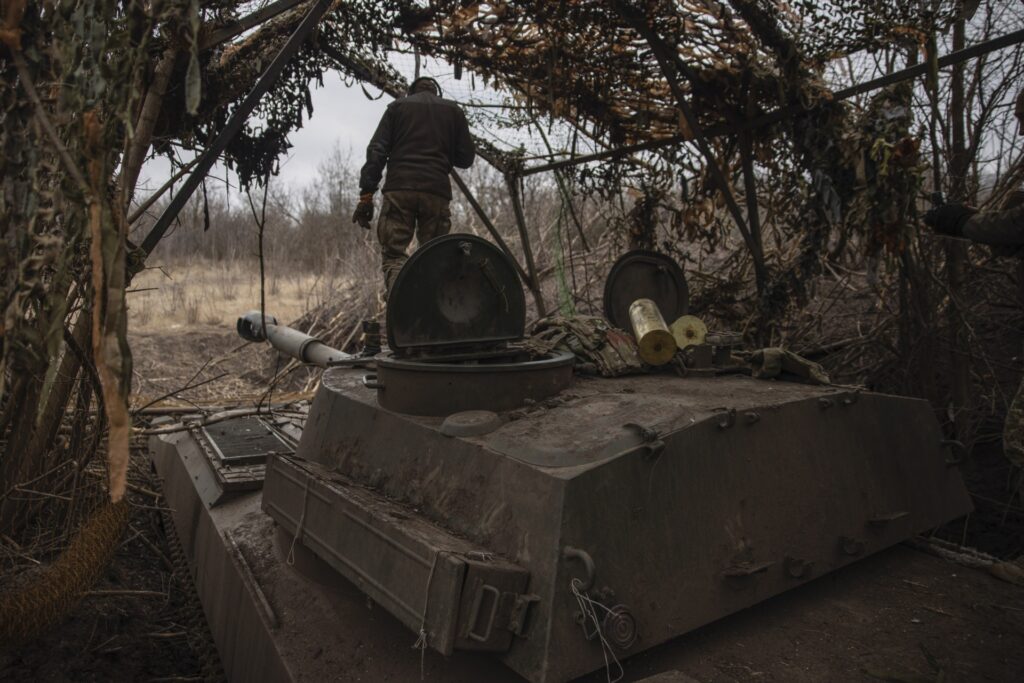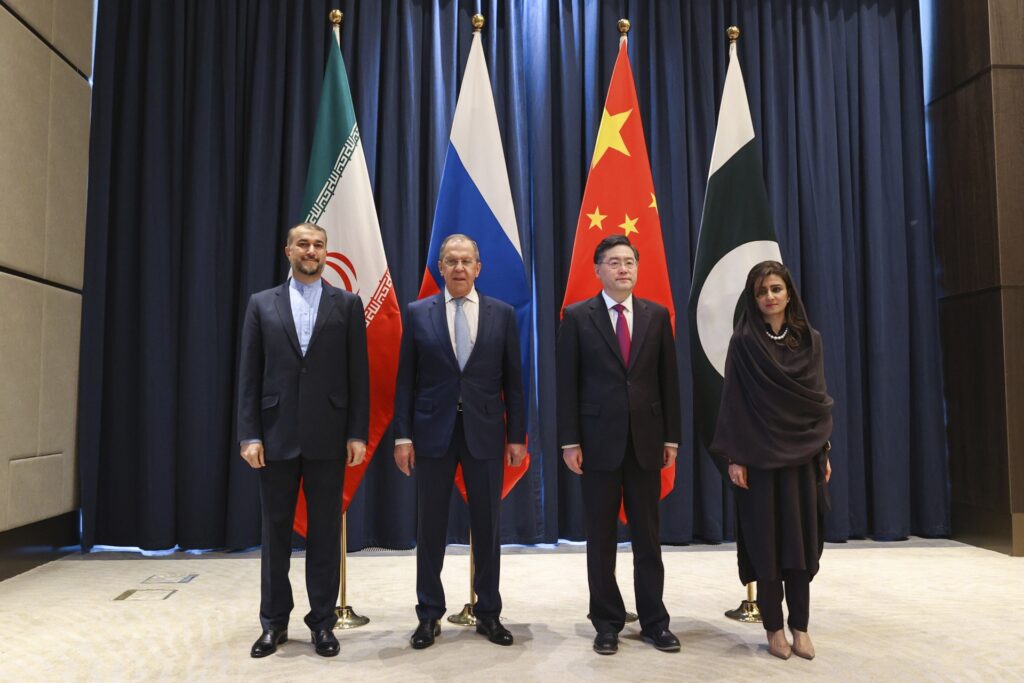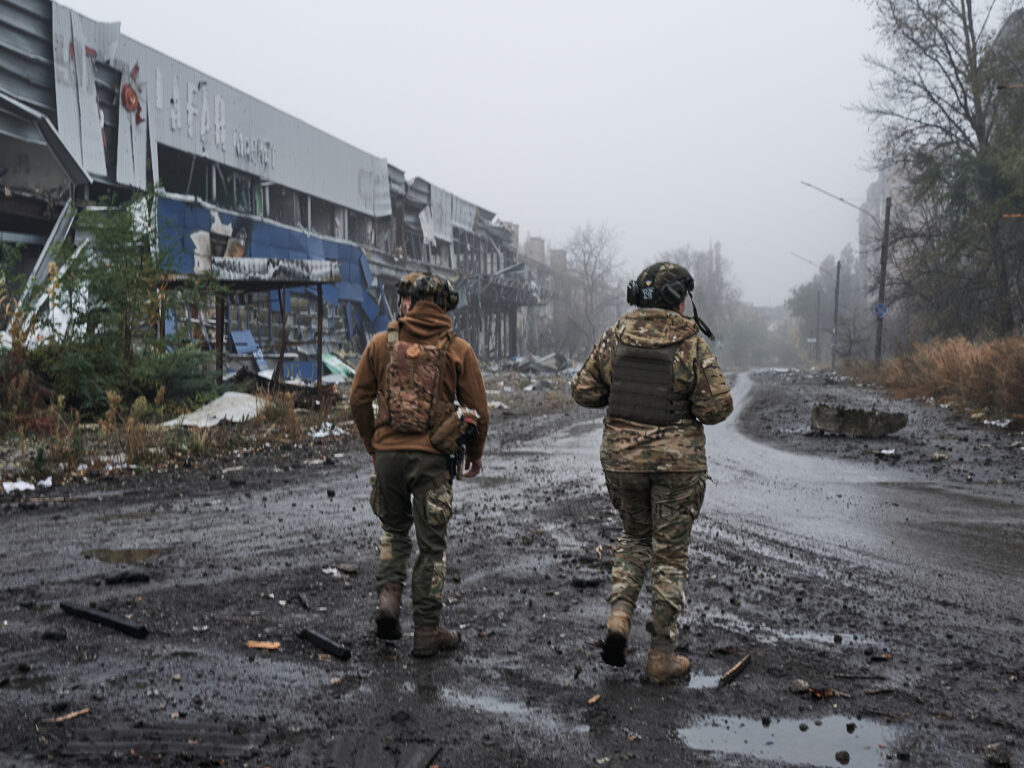Top News
Exclusive — Lt. Col. Daniel Davis on Ukraine-Russia War’s 2-Year Mark: ‘No Path’ to Ukraine Victory, U.S. Influence ‘Waning’

There is “no path to a military victory for Ukraine,” and further aid packages will have virtually no effect on the conflict’s outcome, according to retired Army Lt. Col. Daniel L. Davis, who warned that American influence is waning as the Russia-Ukraine war enters its third year.
In an exclusive interview with Breitbart News, Davis, a Defense Priorities senior fellow and military expert who retired from the U.S. Army as a Lt. Col. following his 21 years of active service, addressed Russia’s war in Ukraine, claiming that the two-year mark of the conflict “actually represents a full decade of diplomatic failure.”
Impossible Ukrainian Victory
“There is no path to a military victory for Ukraine, and that has just been solidified more so today than at any point,” he stated. “It is incredibly clear that there is no possibility for Ukraine to ever win the war as defined by pushing Russia back to the 1991 border. It’s never gonna happen.”
“I don’t care how many years they fight, or how many millions of artillery shells the West provides for them — that’s never gonna make the difference,” he added. “You can’t undo the damage that’s already happened in the last two years.”
Calling it “insane to continue trying to achieve the unachievable,” he insisted that that is exactly “what we’re doing right now, both in the West and Ukrainian President Volodymyr] Zelensky.”
According to Davis — who spent more than two decades in active service including combat deployments in Iraq and Afghanistan and was awarded two Bronze Star medals — Zelensky is unwilling to make any kind of negotiated settlement with the current line of contact, preferring to gain everything back “even if it takes years.”
U.S. President Joe Biden is greeted by Ukrainian President Volodymyr Zelensky during a visit in Kyiv on February 20, 2023. (DIMITAR DILKOFF/AFP via Getty Images)
“But his country doesn’t have the capacity to go more years; he doesn’t have the troops to go more years,” he explained. “They’re already scraping the bottom of the barrel now; they can’t replace [soldier] losses, and they suffer more losses per month than their ability to forcibly mobilize new replacements.”
In addition, he noted, “when you forcibly mobilize people to the level that they are right now, those are not going to be good soldiers.”
“Especially after you’ve [Ukraine] lost at least a half a million killed and wounded over the course of the war. Almost all of those who were in uniform at the start of the war have either been killed or wounded or removed from the battlefield in one way or another,” he said.
“So you’re basically trying to create a new army from scratch, which means nobody has experience at the key levels,” he added. “You can’t build an army like that. You just can’t get past that.”
The War Is Over
Davis rejected White House national security spokesman John Kirby’s “nonsense” assessment two days prior to the fall of the eastern Ukrainian city of Avdiivka, that it would soon fall because Congress “hasn’t cut loose” the $60 billion aid package, and there is a shortage of artillery shells.
“That’s nonsense [because] that money would have had absolutely zero impact on that battle,” he stated. “It’s not as though there’s a bunch of pallets of 155mm shells sitting in Costco somewhere, and if you just had the money, you could just go buy them. That’s not the case.”
“We’re already doing everything we can in both the United States and the Western Europe to create as many artillery shells as we can but there’s problems with production,” he explained.
Citing a recent Defense One piece confirming that the U.S. Army is constructing three Texas-based 155mm artillery ammo production lines, each projected to produce 30,000 shells monthly by end-2025, Davis, a former tank commander, noted that such a move “means it will be 2026 before any of those shells in any numbers are coming off the role.”
“What good is that gonna do?” he asked. “That’s not anything that’s going to help.”
During a Joint Press Availability at the State Department with NATO Secretary General Jens Stoltenberg last month, Secretary of State Antony Blinken called for Congressional support for Ukraine, while noting NATO’s signing of a $1.2 billion contract to produce 220,000 artillery shells — which Davis described as “enough for about two to three weeks of normal use.”
“And that won’t even be produced for two years,” he said, noting that Blinken had not mentioned that fact.

In this handout photo from the Ukrainian Presidential Press Office, Ukrainian President Volodymyr Zelensky meets with a delegation including U.S. Secretary of State Antony Blinken and U.S. Defense Secretary Lloyd Austin on April 24, 2022, in Kyiv, Ukraine. (Ukrainian Presidential Press Office via Getty Images)
“So you see that was something that was done a month ago, and so you cut loose to $60 billion now, it’s not going to have any impact on the frontline for the foreseeable future, regardless of whether it gets released or not,” he added.
According to Davis, the status of the war “is being decided by the actions at the front line,” particularly the increasing Russian capacity and supply of ammunition.
“The decreasing supply on the Ukrainian side, which I have been addressing since the late spring of last year, that there is a math problem — that there’s not enough shells being produced in the amount that they were using in that offensive [which] creates a mismatch, that at some point [it will] start running out,” he said.
“And that’s precisely what happened because it’s just predictable, as Monday follows Sunday,” he added. “It’s just a math issue; a physical issue — there’s so many of those things at play.”
Despite those “legitimately [pointing to] the Ukraine side,” noting that even without a Navy it has managed to “knock out around a third of the [Russian] Black Sea fleet,” Davis admitted it was “an amazing accomplishment” but “probably speaks more to the fact that the days of the surface fleet are over worldwide, not just the Russian naval fleet.”
“Our fleet is probably a lot more volatile than we think it is. That’s probably the bigger lesson there,” he added, noting that the fact “has almost nothing to do with the frontline.”
According to Davis, everything that goes into building national military power is in Russia’s favor.
“Their industrial capacity, their manpower pool, their political will in the country, that they’re still willing to go on, that they’re recruiting tens of thousands of people per month, that they still don’t have to force mobilize, and that they’re volunteering to show up,” he said.
“The Ukrainian side doesn’t have that,” he added, highlighting how the average enlisted Ukrainian soldier is 43-years-old. “Ukraine is losing more men per month than they’re bringing in. So you see the numbers just don’t work in any category you want to look at. The war is over and it’s not going to be won by Ukraine.”
The U.S. ROI Argument
On geopolitical arguments that favoring such an unwinnable war presents a prime opportunity for the U.S. to weaken Russia’s military strength regardless of a Ukraine victory, Davis described them as both “immoral” and “disgusting,” asserting that it “basically ignores the cost to the Ukrainians in blood, and all the men that have been lost there.”
“Somehow that’s cool for us, because it ends up harming our geopolitical enemy opposition,” he said. “We’re not at war with Russia, so you can’t say ‘our enemy’ because we’re not fighting, though they are.”
“But the people are applauding because it hurts Russia,” he added. “That’s not right.”
He also criticized claims that the conflict is “great for business.”

Ukrainian soldiers prepare a self-propelled artillery vehicle Gvozdika to fire towards the Russian positions on the frontline in the Donetsk region, Ukraine, Friday, Feb. 16, 2024. (Roman Chop via AP)
“You’ve had all kinds of leaders, and Blinken, saying that most of this money is going to America, so it’s a win-win,” he said. “But just to say that we’re benefiting financially from the deaths of thousands and thousands of people in a war that has nothing to do with our national security is disgusting to me.”
“It just turns my stomach that people brag about that openly,” he added. “And I guess at least they’re doing it openly and being honest in that regard, but the whole thing is just nonsense.”
Aid Package
Davis took issue with those “screaming to get that [aid] package released,” because they are “implying that that’s going to be the thing that’ll change the dynamics in the field.”
“If Zelensky’s right, this is a multi-year deal that is going to have to go [on]. So we gave, along with Western Europe, around $200 billion, maybe a little bit more than that, in the first 18 months of the war, along with thousands of pieces of equipment,” he said. “Obviously that did nothing during the offensive. It didn’t dent the line.”
“What little dents that they made have been lost because Russia is now on the move offensively,” he added.
He then questioned who exactly was “signing up in the West to say this $60 billion will only be the last installment?”
“It is going to be another $50 billion come later in the year, and then every year for the foreseeable future we’re going to have more tranches of $50 billion. Have you heard anybody saying that? Is anyone talking about that out loud? Nobody,” he said.
“Europe passed a $50 billion bill for four years [and] there’s no evidence they’re going to do anything more and that money is basically going for administrative operations within the country itself — that’s the majority of that, not even for the war per say, even though they’re trying to do some of the stuff,” he added. “Well, you can’t keep going with that when Russia has no constraints. They’re continuing to increase in every capacity.”
Davis asserted that if one chooses to be “logical, rational and willing to look at things as they are on the ground,” then no one will “conclude that this war can be won by Ukraine.”
“It can’t even be a stalemate by Ukraine unless a miracle happens and the Russian army just disintegrates for no reason,” he said. “But that’s a terrible bet to make, it’s more of a gamble that is far more likely to lose than win.”
China-Russia-North Korea-Iran Axis
Turning to the strategic alignment among Russia, China, and Iran, characterized by their collaborative efforts in geopolitical, economic, and military domains, Davis explained how the current partnership between those states was emboldened by the current conflict.
“Before this war started, the four big boogeymen we always wanted to talk about: Russia and China, North Korea and Iran — none of them were working together,” he said. “They were all separate because they had many economic and geopolitical reasons not to work together because that would raise alarm bells [and] create sanctions or other negative actions that we might take.”
While it “wasn’t in their interest to do so” in the past, Davis noted, our active engagement in the current war between Russia and Ukraine has “eliminated a lot of the reasons why they would have removed themselves from doing that,” leading to “much stronger ties” between Russia and China than before.
“Now you have direct military ties between Russia and North Korea, and Russia and Iran, to the point of literally providing weapons and ammunition on the battlefield,” he added, “just like we’re doing for Ukraine, they’re now doing for Russia. That would have never happened before.”

In this handout photo released by Russian Foreign Ministry Press Service, from left: Iranian Foreign Minister Hossein Amir-Abdollahian, Russian Foreign Minister Sergey Lavrov, Chinese Foreign Minister Qin Gang, and Pakistani Minister of State for Foreign Affairs Hina Rabbani Khar pose for a group photo during a ministerial meeting in Samarkand, Uzbekistan, Thursday, April 13, 2023. (Russian Foreign Ministry Press Service via AP)
Pointing to a joint naval exercise between Russia, Iran, and China announced this month, Davis asserted that that alliance is not going to “magically stop” if this war ends tomorrow and is actually “improving.”
“So everywhere you want to look, our influence is waning,” he added.
Ceasefire
As a result, Davis advocates for an immediate end to the war.
“Let’s get a ceasefire right away and then let’s get a negotiated settlement, even if it takes another year to do,” he said. “But let’s stop this because we need to stop the bleeding — both of the Ukrainian people, first and foremost, and then, secondly, our influence around the world needs to stop bleeding because that’s exactly what it’s doing.”
“Right now, those are the things that exist at the moment, and most of those are financial or economic, geopolitical or are just mental, and just how people feel and sense,” he added.
He then warned that if the current conflict continues, it can turn into a “physical military defeat” for our side:
Imagine if what I project continues on; if we continue our fiction that Ukraine is gonna win this war; we’re just going to keep providing as Kamala Harris said a few days ago, “as long as it takes,” repeating that mantra; and all of the sudden the battlefield realities play out as they probably will, and Ukraine has to negotiate terms of surrender. Not even a negotiated settlement, but just terms of surrender because Russia continues to move their forces and in a year from now, they’ve taken Kharkiv or Odesa or possibly even both, and are moving even closer in the direction of the capital city. Those are not outlandish possibilities, if we continue on the current path, for the reasons I laid out earlier. Imagine how bad things would be for us in that case. Everything that we have tried, all the fiction that we put up, has finally crashed into reality, and reality imposes itself over the spin and the fiction — our credibility will be shot even with our friends, much less our adversaries. So you want to see things get worse? Keep going with the fiction and see how that works out for us.
Future Outcome
Regarding how he envisioned the war a year from now, Davis stated that the determining factor is “art more than it is science.”
“Ukraine is going to have a hard time not breaking their army somewhere along the line of contact before the summer is over,” he said. “Maybe they can hang on. They certainly surprised me in their resilience before but now that you’re talking two years in and all the evidence continues to go against the Ukraine side, they see it, they see the political dysfunction.”
Though “nobody ever wants to talk about it in the West,” Davis explained that “even if we give this money, even if they get a bunch more tanks and everything else, the tactical performance of the senior Ukrainian leaders has been terrible at the operational level” in his view.
He also noted that the summer offensive and the tactics used were “predictably” doomed to fail.
“Everybody knew where they were going. They telegraphed it. The New York Times published articles about what was going to happen. The Ukrainian people themselves told about what they were going to do and where they were going to try to go, and Russia was ready for it,” he said.
In addition, he stated, the “way that they fought, that I wrote months prior to the offensive’s start, would end in disaster for predictable reasons, was a failure.”

Two Ukrainian soldiers walk along the destroyed city in the fog on October 26, 2023, in Avdiivka, Ukraine. Fighting has intensified in recent days after Russia launched a major offensive here this month. (Vlada Liberova/Libkos via Getty Images)
“Their leaders didn’t know it was going to be a bad idea; they thought that it would work and they went down,” he said. “But their performance at the operational level has been abysmal.”
“While it is still technically possible for the Ukraine side to turn it around, I don’t see any evidence that they’re going to,” he added.
Earlier this week, Davis discussed a new offensive from Ukraine on his Deep Dive show.
In October, Davis insisted that current clashes in the Middle East are part of a larger picture of volatility in a wide range of countries amid the global loss of American prestige and influence
Previously, he warned that the United States has “no plan” or strategy in Ukraine and that invoking NATO’s “mutual defense” clause could trigger a nuclear war.
Joshua Klein is a reporter for Breitbart News. Email him at jklein@breitbart.com. Follow him on Twitter @JoshuaKlein.
Read the full article here


















